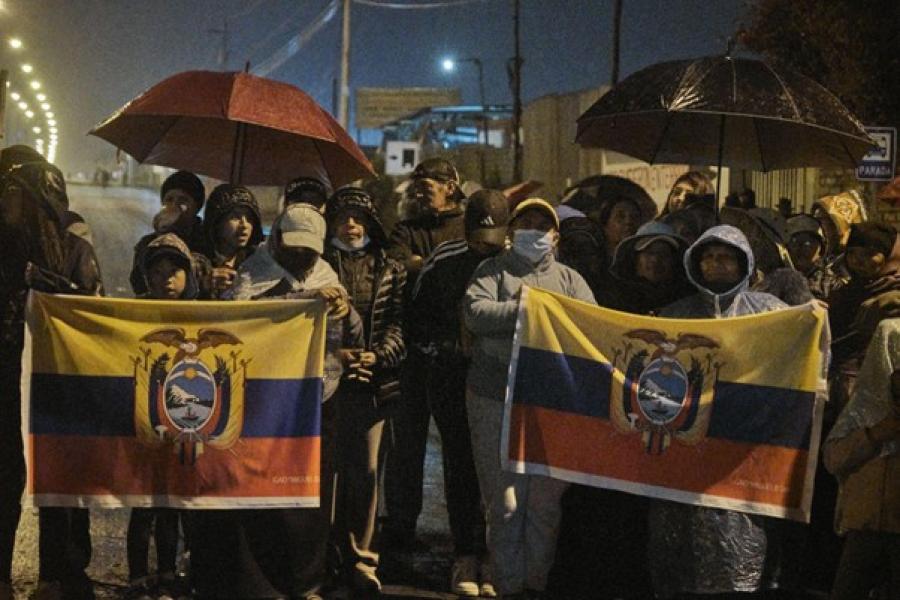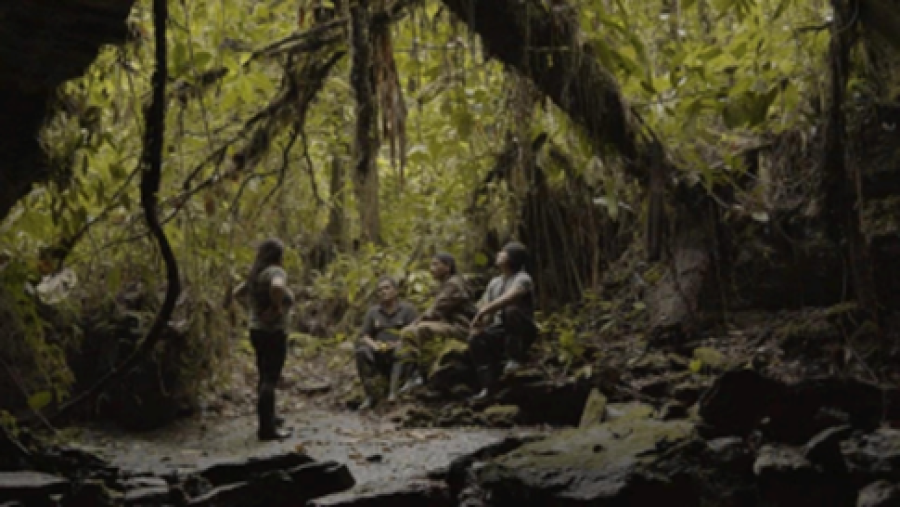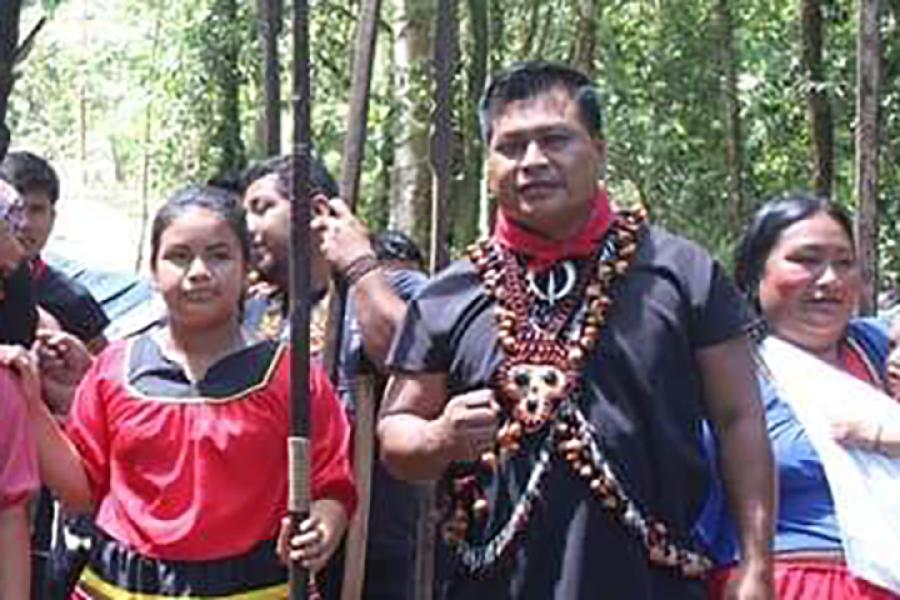By Francesco Torri
Seen from above, the wooden houses of the Maikiuants village are small, brown dots surrounded by a multitude of high and weirdly shaped trees. “We, Shuar Arutam people, preserve the forest. We protect it. That’s why it’s so wild here, so beautiful,” says Ambrocio (Shuar Arutam), a community leader. All around are mountains covered by dense vegetation. Here is where the Ecuadorian Andes dive into the Amazon jungle; far away, on the horizon, is the “Cordillera del Condor,” behind which Peru begins. “Up to the Cordillera it’s all Shuar territory, around 230,000 hectares. Today, more than half of our territory has been granted to mining companies,” Abrocio says.
Maikiuants is hard to reach. It is a three-hour drive from the closest village, Limòn Indanza, on a very dangerous dirt road that is frequently hit by landslides. “The road is new, built in 2019. Before, we would walk through the forest for one or two days to reach Limòn,” says Freddy, a young man from the village. “The company Solaris built it, but now it doesn’t even use it. They only move by helicopter, you will see.” Sure enough, in a few minutes, a helicopter loudly flies above our heads, charging a huge load with a hanging rope. According to Freddy, they pass at least three times per day.
Solaris Copper Inc. is a Canadian mining company that installed its basecamp a few kilometers from Maikiuants in service of the Warintza Project, a copper mega-mining project named after the nearby Shuar community, Warints. Since 2003, a Solaris subsidiary, then called Lowell Mineral Exploration, has been working to start mining activities on this 10,000-hectare concession where over 45 Shuar communities live. From the beginning, the project faced intense opposition from the Great Interprovincial Federation of Shuar Centers, and in 2006, the company was forced to leave the territory. Several Elders still remember with pride the day they managed to evict the military that arrived with helicopters and got Lowell’s CEO to sign an agreement to never return to the territory.
But this was just the beginning of the fight. In 2019, Lowell Mineral Exploration was incorporated by Solaris and strategically re-named Solaris Resources, owned by Richard Wark and part of the Augusta Group, a Canadian and U.S.-based management group focused on the mining sector. Meanwhile, a new Shuar political organization was formed, Pueblo Shuar Arutam, a pilot project aimed at strengthening self-determination, governance, and autonomy with its headquarters in the community of Maikiuants.
This reportage shows the dark side of the energy transition, seen through the eyes of the Shuar Arutam Peoples, an Indigenous population opposed to copper mining in the Ecuadorian Amazon.
Pueblo Shuar Arutam, then led by Josephina Tunki, soon became the frontline of the fight against mining projects in the territory and started assiduously monitoring Solaris' movements. To organize a new resistance, Pueblo Shuar Arutam conducted a consultation process with all 47 communities inhabiting the Shuar territory to gather a snapshot of everyone’s position with regard to mining. The result was clear: the Shuar Arutam People firmly rejected mining. This led to the declaration of the Shuar territory as a “Territory of Life and Free of Mining.”
However, the Warintza Project has always been Solaris’ most valuable asset, and the company soon started taking action and developing strategies to overcome the opposition. Without the consent of local communities, it is difficult for a company to obtain the necessary licenses to start the exploitation phase. That’s how the strategic alliance with the Yawi and Warints communities started, a divide-and-conquer approach aiming at manufacturing consent through monetary benefits and development promises.
Yawi and Warints are the two communities closest to the main mining area, and in order to upgrade their health and education infrastructure, they broke ranks with Pueblo Shuar Arutam and opened dialogue with Solaris, allowing two community members to sign agreements with company representatives. “The company took advantage of the conditions and needs of these communities to advance its operations, and in this way, the other 45 communities are at risk of being severely compromised by the environmental impacts of the project,” says Nancy, a Maikiuants leader. “The company now boasts a strategic alliance with Yawi and Warints as an example of ethical mining and successful community relations, but it’s a lie. It’s the same abuse of power and manipulation of the old colonial powers; it’s just more sophisticated,” she says.
The copper mining project Warintza is being developed by the Canadian company Solaris Resources, part of the US group Augusta, and listed in the New York and Toronto stock markets.
Nancy is right. Solaris’ website features photographs of company representatives surrounded by dozens of smiling Shuar people holding signed papers, which can easily give the illusion of harmonious cooperation. However, the reality one can see in the territory is different. “Yawi and Warints received money and fancy SUVs, that’s true. But they keep living in the same misery without basic hygienic services or adequate education infrastructure...it’s actually worse, as now many of them have alcohol problems due to the money flow they suddenly experienced,” Don Pinchu says.
Warints and Yawi are about seven kilometers from Maikiuants, right at the edge of Solaris Basecamp, where exploration activities are carried out. To get to these two communities, cars have to pass through Maikiuants, which therefore holds a strategic position for the company. For this reason, in 2023, Maikiuants women formed a front of resistance led by Tunki and decided to block the road to the company’s vehicles. This created internal armed conflicts with the other communities, but for several months they stood their ground. In response, the company started using helicopters to move resources.
“The company never respected our position,” explains Tunki. “They never even consulted us, never came to speak a word to me when I was representing my people as President of Pueblo Shuar Arutam. I had a few chats with the company’s representatives, and in one of these, I received a death threat. They said that they’d have to behead someone if they kept ruining the company’s image nationally and internationally.”
In 2023, Tunki stepped down as president, and this led to an escalation of discord among the members of the organization. The company quickly took advantage to co-opt some leaders of the Inter-Provincial Federation of Shuar Centres (FISCH), which hierarchically supersedes Pueblo Shuar Arutam, in order to weaken the opposition. The situation reached its most critical moment in April 2024 when violence exploded between pro-mining and anti-mining groups outside the FISCH offices in Sucua during the early elections of the new president.
Copper extraction constitutes a serious risk to nature and to the Shuar people, who have inhabited the forest for thousands of years and depend on it for their livelihoods.
The General Council of FISCH felt the urge to speak up against the questionable choices of the former president, David Tankamash, during a press release at the Prospectors and Developers Association Canada meeting, the biggest mining convention in the world: “This agreement, which has been approved by the will of the FICSH General Assembly, is important for inclusive and sustainable mineral resource development. The Solaris model proves that the Shuar Nation can partner with us in developing opportunities on our lands. We deserve the opportunities Indigenous Nations have in other parts of the world, and foreign NGOs must respect our choices.”
Today, only a few communities continue resisting the project and rejecting Solaris' attempt to corrupt them. Among these, Maikiuants and Chichis lead the way. However, the stakes are increasingly more critical as newly elected head of state, Daniel Noboa, explicitly supports mining, declaring Ecuador as the new world’s best mining destination and signing a Free Trade Agreement with China. In January, Solaris secured a $130 million CAD investment from the Zijin Group, a Chinese leader in the mining sector, and at the end of April, it started conducting the last part of the exploration process before the exploitation phase begins. At the same time, Solaris announced in a press release an official request to the government to acquire 10 new explorations concessions for planned 2024 and 2025 programs and announced that “drilling continues to ramp up, with 6 rigs having completed over 5,400 meters in April, nearly a new record monthly meterage for the Project.”
“It isn’t a promising scenario,” says Jaime Palomino, the current President of Pueblo Shuar Arutam. “But we must remember the victory of the Shuar Arutam people in front of the International Labour Organization, whose committee recognized a violation of our right to Free, Prior and Informed Consent by the company Solaris. I hope this milestone will lead to more stringent controls by the government on Solaris' conduct and, therefore, to a proper consultation process that will allow us to unite again in one voice and say ‘No!’ to any mining activity in our territory.”
--Francesco Torri is a freelance environmental journalist, photographer, and video-maker from Italy. He spent the last three years investigating socio-environmental conflicts related to extractivism in Latin America, with a focus on strategic metals and minerals demanded for the "green" energy transition. Follow Francesco Torri on Instagram at @resistance_voices.



